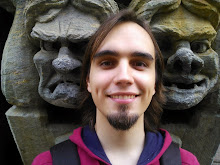Even though this blog is presumably devoted to explorations of interiors of consciousness, at some point the so-called "interiors" start to include pretty much everything, for the phenomena in the exterior world start to touch something deep inside you. It happens when your self-identity transcends an exclusionary identification with a more limited perspective on yourself and the world and goes beyond into the worldcentric and even Kosmocentric kingdom of perspectives.
You spontaneously begin to discover universals that are shared among all human beings of any race, ethnicity, creed, sex, faith, and so on. You begin to realize that all sentient beings share the same basic taste of
duḥkha—or uneasiness, disquietness, anxiety, soreness—which is the Buddhist term for the basic sliding condition of one's unknowingness about one's own exclusive preconscious attachments to certain subjects-and-objects interrelations in the overall stream of phenomena that flows through all domains of the experiential matrix. All experiences and all perspectives are impermanent in that they actually seem to be vibrating and dynamically changing currents of dialoging aspects of the Kosmos. And even the most stable ones, such as certain physical laws of the universe, are considered by such brilliant folks as Charles Peirce to be
more or less stabilized habits evolved through aeons of cosmic evolution:
For Peirce, the entire universe and everything in it is an evolutionary product. Indeed, he conceived that even the most firmly entrenched of nature's habits (for example, even those habits typically called “natural laws”) have themselves evolved, and accordingly can and should be subjects of philosophical an scientific inquiry. One can sensibly seek, in Peirce's view, evolutionary explanations of the existence of particular natural laws. For Peirce, then, the entire phaneron (the world of appearances), as well as all the ongoing processes of its interpretation through mental significations, has evolved and is evolving. ("Charles Sanders Pierce" in Stanford Encyclopedia of Philosophy)
If you are unaware of the sliding nature of the phaneron (as we naturally are more or less most of the time), then you tend to attach yourself to this or that experiential leaf that is being carried by the seemingly chaotic current in the ever-pervading ocean of global awareness. You are preconsciously attaching yourself to the plenitude of your adaptive personae, to your constructions about your own identity, to your intuitions about what it is like to be your own self, to your current state (or dynamic systems of states) of embeddedness with this or that whirlpool in the great matrix (
mātṝkās); and when this or that aspect, or perspective, on reality transmutates, with you being unable to consciously follow its transformation by transforming yourself, you experience dying and suffering and soreness and pain and grievance—and you might even become attached to this newly-formed state of condition once again, indefinitely.
But when you become increasingly aware of the sliding nature of the world of appearances, you cannot help but start experiencing profound compassion and care for each and every aspect of it, for each one of them is so aesthetically perfect, so ethically tender (cf.
the meaning of sawubona), so structurally unstable that even a slightest glance at a phenomenon makes it move beyond itself into the next stage of transformation. Compassion is the foundational artistic tool with which the superconscious artist constantly paints new panoramic snapshots of being. It helps to preserve, to cherish, to nourish, and to prepare for further stages of transformation.
That's the thoughts that emerged during my acquaintance with the recent story of
Aleksey Dymovskiy, a detective officer of Russian militia, who has single-handedly attempted to voice (to cry out loud, actually) his concern regarding corruption and catastrophic condition in one of the local law enforcement units of the Department of Internal Affairs by courageously posting
two videos on YouTube in which he stated that he just "had enough" of local corruption, fabricated cases, and working in an extremely stressful environment without holidays, without being paid, and without any health care.
(See also a Times Online article.)
Even though Dymovskiy spoke about the state of art in the local unit, it is no secret to anyone who lives in Russia that precisely the same points apply to virtually all the departments of the Ministry of Internal Affairs and
militia (militsiya) in general. In St. Petersburg alone there has recently been numerous cases when
militsiya members (of very high ranks) were caught at doing serious crimes (involved robbery and serial murders, not to mention the common practice of bribery that is widespread
everywhere and became a cultural norm long ago). For instance, last year there was the notorious case of "
black realtors" when some high-rank members of local
militsiya were involved in murdering
dozens of lonely people so as to sell their apartments (real estate prices in the major Russian cities such as St. Petersburg and Moscow are extremely high—dozens and in many cases even hundreds times higher than the average income of an average Russian). In another case a criminal investigation department was found guilty of creating a widespread system of
drug trafficking and distribution (which seems to be a common practice in Russia; the pandemic is
systemic). Their name is Legion, for they are many.
Sadly enough, long time ago law enforcement system became the most feared seat of uncontrolled criminal pathology in the post-Soviet societies. Every day
thousands of people all over Russia get abused, beaten, and killed in the streets by local patrolling
militsiya whose vertical center of gravity seems to generally revolve around the opportunistic stage in ego development theory; red (power-driven) stage in Spiral Dynamics/Clare Graves's theory of values development; and preconventional stage of Kohlberg's moral development. In the psyche of a common Russian, any communication with
militsiya is fulfilled with the fear for potential massive abuse. And all of it is just one, if all-pervasive, aspect of the ongoing sociocultural catastrophe in the Russian Federation and some other post-Soviet states.




